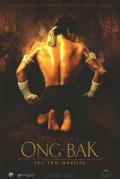Details

- Title
- Ong-Bak: The Thai Warrior
- Director
- Prachya Pinkaew
- Cast
- Tony Jaa, Petchtai Wongkamlao, Pumwaree Yodkamol, Suchao Pongwilai, Wannakit Sirioput, Cumporn Teppita, David Ismalone, Sukanya Kongkawong, Erik Markus Schuetz, Nick Kara
- Length
- 101 min.
- Released
- 2003
Review
Detractors of the kung-fu genre reliably point to stock plots and characters. Such literary analysis fails to recognize that a great martial arts movie is the closest one can get to pure cinema outside of the generally ignored avant-garde. It's all color and motion: Chang Cheh is practically Peter Kubelka. With kicking. Which brings us to Ong-Bak: a movie about which every statement ought to be followed by with kicking.
Yes, the plot is generic. No, that doesn't matter. Several of the fight sequences rank among the very best since the golden days of the Shaw Brothers' Hong Kong. The whole proceding bleeds through with a raw vitality. A feeling which, after a few brief expository scenes, settles in the viscera and leaves you, after the movie, sweaty and feeling like you've actually seen something. This is as close as you can get to a genuine experience short of actually having Tony Jaa kick you in the face.
The complaints about the genre have resulted in a recent glut of self-consciously high-art wire-fu epics. They've been good movies, but have generally lacked one essential component of good kung-fu movies. They have lost the spectacular performative aspect that is so integral to their appeal. Why does every martial arts movie from 1970 to 1985 have a training sequence? Because more, even, than fighting, these are about watching kung-fu being performed.
Ong-Bak is less about performance than it is about violence. The film is built around two main set-pieces: one in an underground Thai fight club, the other in a cave full of henchmen. Both are long, as more and more people appear out of nowhere to fight Tony Jaa, but you never get the feeling that it is becoming more of the same. The fights remain fresh and imaginative throughout. And throughout they are: about 85% of the movie is within a three second radius of somebody getting kneed in the face.
Jaa employs an intense fighting style known as Muay Thai. All elbows and knees it places Tony Jaa in extremely close proximity to whosever ass he is kicking at the moment. While really great kung-fu choreography is rightfully described as balletic, Muay Thai seems less like dancing and more like a very beautiful game of chess. It's all move/counter-move, we can see the logic unfolding, if we can watch fast enough. For this reason it never seems improbable that Tony Jaa makes it through most of the movie without being hurt: we don't merely see that he doesn't get hit, we see why he doesn't get hit.
While he is obviously the main attraction, Tony Jaa isn't the film's sole force. Director Prachya Pinkaew does an expert job of making the fights coherent, of moving the plot along briskly from set-piece to set-piece, of keeping things stylish and tasteful. Skillfully avoiding the typical gratingly asinine bumbling-sidekick comic-relief, we instead get a few really great throw-away jokes. It's the details that keep it from being merely a great martial arts movie. It's the details, like the great Thai rap on the soundtrack and the streamer of drool hanging from the drugged up super-henchman's lip, that make it a really good movie regardless of genre.
It's the details. With kicking.
- Rating
- 6/8
- Reviewer
- Pat Jackson
- Published